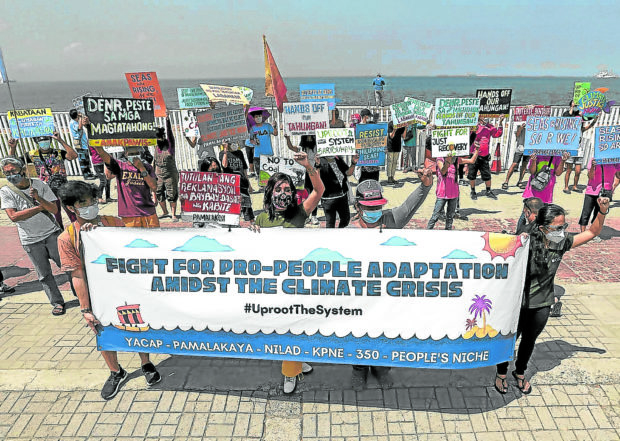
CLIMATE PROTEST Activists and fisherfolk stage a protest rally against the dolomite beach reclamation project in Manila. —RICHARD A. REYES
MANILA, Philippines — In a historic first, the United Nations (UN) Human Rights Council on Friday recognized that access to a safe and healthy environment is a fundamental human right and created the office of a special rapporteur on human rights in the context of climate change.
The 47-nation council passed Resolution 48/13 with no opposition, but China, India, Japan, and Russia abstained.
For Resolution 48/14 creating a new rapporteur, 42 states voted in favor, with only Russia opposing the resolution. China, Eritrea, India, and Japan abstained.
The Philippines voted yes to both resolutions, which are seen as monumental efforts to address and respond to the climate crisis, weeks ahead of the UN climate change conference in Glasgow, Scotland, in November.
UN High Commissioner for Human Rights Michelle Bachelet, who has long called for such a step, lauded the recognition of the Human Rights Council.
“Bold action is now required to ensure this resolution on the right to a healthy environment serves as a springboard to push for transformative economic, social, and environmental policies that will protect people and nature,” she said.
Environment, climate, and human rights groups also welcomed the UN’s move.
‘A big step forward’
“This resolution brings hope in the context of widespread and increasing climate disasters, and is a milestone moment in the battle against environmental degradation,” said Ashfaq Khalfan, Amnesty International law and policy director.
Greenpeace Philippines said the recognition of a healthy environment as a fundamental right “vindicates” the struggles for environmental justice of Filipino communities and environmental defenders.
“It is a big step forward that will further empower communities to continue rightfully demanding action from governments to urgently address ongoing environmental crises,” said Lea Guerrero, director of Greenpeace Philippines.
The group also said the creation of a special rapporteur comes at an opportune time, as the country awaits the resolution to the National Inquiry on Climate Change being undertaken by the Commission on Human Rights (CHR).
In September 2015, civil society organizations and private individuals filed a petition before the rights agency to investigate the responsibility of fossil fuel companies in producing greenhouse gases that cause climate change.
‘Carbon majors’
After a four-year investigation, the CHR said that the so-called “carbon majors” might be sued and held legally and morally responsible for human rights violations for causing climate change that devastated communities in the country. At present, however, its full decision has yet to be made public.
“We hope these resolutions serve as call to action not just for the Philippine government to protect the rights of its citizens, but also for other countries to act urgently on the climate crisis and ensure that businesses do not harm the environment and the rights of people,” Guerrero said. INQ

